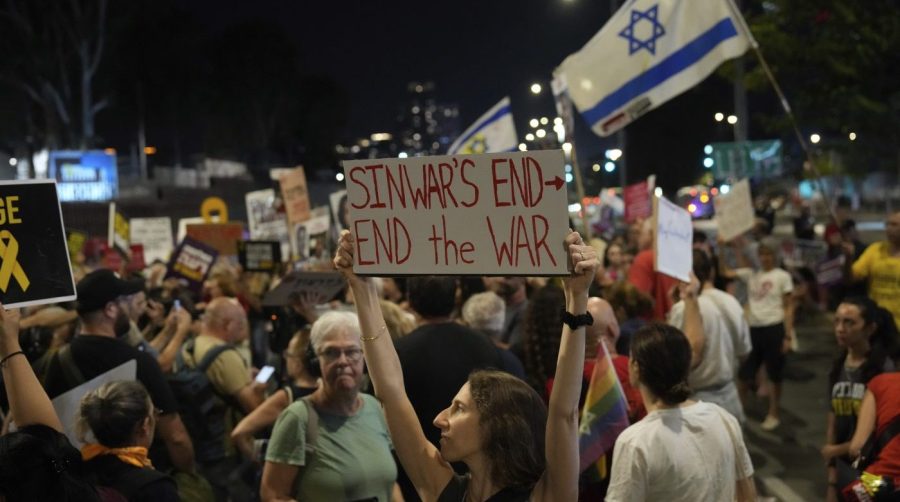
I shed no tears over the death of Yahya Sinwar, architect of Hamas’s brutal Oct. 7, 2023 attack on Israel. Sinwar’s vicious leadership of a designated terror organization resulted not only in the barbaric murder of over 1,200 Israelis and the abduction of over 200 Israeli hostages, but also triggered a war that plunged the Middle East into a regional conflict resulting in the death of tens of thousands of Palestinians — innocent pawns in Sinwar’s homicidal vision.
Sinwar’s death is a testament to the enduring bravery of the Israel Defense Forces — a just and necessary conclusion to this human embodiment of evil.
Israel now has a choice to make. How will it respond to this tectonic development? Will it exploit this moment to further its military aims of eradicating Hamas? Or will it leverage Sinwar’s death as an opportunity to secure a pause in hostilities and obtain the release of the 101 hostages estimated to be still in captivity?
Israel is reportedly primed to respond to Iran’s ballistic missile attack of Oct. 1, considered the largest single ballistic missile strike ever. The Israeli military is also fighting to protect Israel’s northern border against the ongoing threat of Hezbollah. Given Prime Minister Benjamin Netanyahu’s right-wing coalition, there will undoubtedly be those who view Sinwar’s death as an opportunity to press the military advantage. What better time, the thinking goes, to finish off Israel’s enemies in Gaza than the very moment that Hamas finds itself leaderless?
Tempting as such arguments may be, Israel would do well to refrain from spiking the proverbial football. According to Jewish law, the principle of “pikuach nefesh” (saving a life) is the north star of all Jewish ethics. Deeply rooted in biblical and rabbinic texts, it is a principle stating that the act of saving a life takes precedence over almost all of the Torah’s other commandments. For instance, a sick person may abstain from fasting on Yom Kippur, or, to use the Talmudic example, one may rescue a person from a collapsed building, even if doing so violates the Sabbath law.
Saving a life is a principle that extends to Israel’s present debate on the hostages. According to Medieval rabbinic authority Moses Maimonides, there “is no greater mitzvah [commandment] than redeeming captives.” The Jewish people share a collective responsibility to bring the hostages safely home. As taught by the rabbis of old: “Whoever saves a single life, it is as if they have saved the entire world.”
Given the paramount importance the Jewish sages placed on saving lives and redeeming captives, Israel has understandably been engaged in a tortured national debate this past year. On the one hand, the rabbinic sources are clear — everything must be done to bring the remaining hostages home.
On the other, and as some authorities argue, there are short- and long-term costs to negotiating the release of hostages. Not only could such deals encourage future hostage-taking, but they could result in further loss of life. Sinwar himself was freed, along with over 1,000 other Palestinian prisoners, as part of the 2011 deal that freed Israeli soldier Gilad Shalit, captured by Hamas in 2006. How many lives could have been saved had Israel not freed Sinwar?
Important as such debates may be, the death of Sinwar offers a moment of clarity, opportunity and especially diplomacy. As evidenced by the August killing of six hostages — including Hersh Goldberg-Polin, an American citizen — Israeli military force alone will not save the remaining hostages.
Having secured the upper hand with the killing of Sinwar, Israel should “take the win,” pause its military advantage and leverage every diplomatic resource at its disposal to negotiate the release of all remaining hostages.
This is truly a “gut-check” moment for every person of conscience to press for the release of the hostages, whose freedom offers the fastest path to a desperately needed cease-fire and to a “day after” plan in Gaza. Now is the time for the entire global community to stand united in its demand for their immediate release. Whatever one’s views may be on the Israel-Hamas conflict, the continued captivity of the hostages is an outrageous human rights violation that must come to an end.
The mitzvah of saving a life takes precedence over every other. As a rabbi writing an article in the midst of the fall Jewish festival of Sukkot, I knowingly disobeyed one commandment in service of another. If, in doing so, this appeal serves to expedite the swift release of the hostages, it will have been well worth the transgression.
Elliot Cosgrove is the rabbi of Park Avenue Synagogue Manhattan and author of the new book “For Such a Time as This: On Being Jewish Today.”

